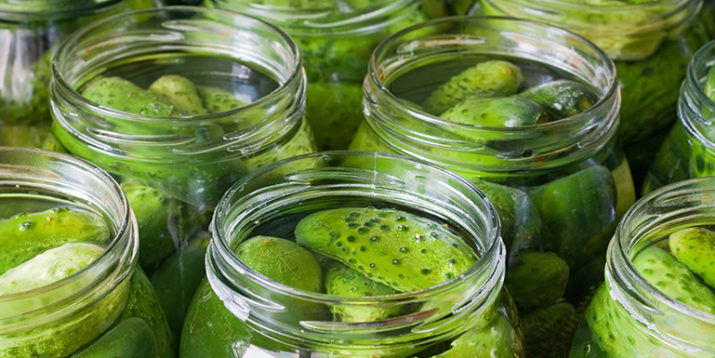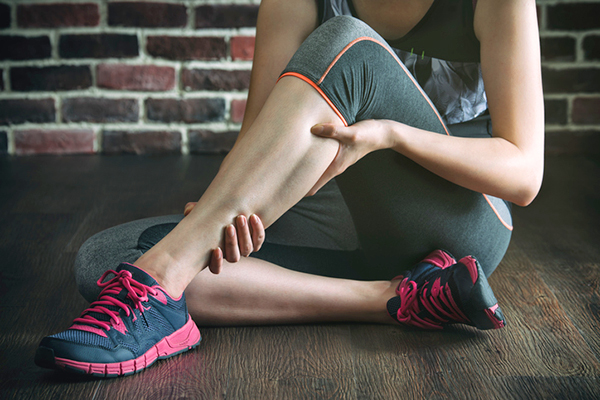How to Get Rid of Muscle Cramps With Pickle Juice

A few weeks ago I ran into a friend on a nearby trail and as we talked he took a long swig of greenish juice from his water bottle. Soon after, the unmistakable scent of dill hit my nose.
“It’s pickle juice,” he said, taking another drink. “I get cramps a lot and it helps.”
There are a ton of great drinks out there that help the body before, during, and after a workout, but I had to admit I didn’t know pickle juice was one of them. Convinced he was trying to pull a fast one, I looked it up.
The science backs his claims. Several researchers have looked into pickle juice’s effect on exercise-induced cramping over the years, and one 2013 study showed that cramps dissipated 45 percent faster when participants drank pickle juice.
Maybe my friend is on to something here.
What Are Muscle Cramps and Why Do You Get Them?
If you’ve ever felt stop-you-in-your-tracks pain in your muscles, you’ve likely experienced muscle cramps. These cramps — often called charley horses — are characterized by a sudden, sharp muscle contraction, usually in the legs and toes, and can last for seconds or minutes. They’re typically harmless, but annoying—especially if they strike at night while you’re trying to sleep.
Muscle cramps can occur at any time, but they can also surface when you repeatedly use a muscle during cardio or resistance training, says Ross Mathiasen, M.D., a sports medicine specialist at Nebraska Medicine. He says the cause of muscle cramps is “not completely understood,” but they could be a result of dehydration, continuous muscle strain (e.g., while exercising), or remaining in a single position for a long period of time (e.g., seated at a work desk or in bed at night while sleeping).
How Pickle Juice May Relieve Muscle Cramps

Early assumptions were that pickle juice helps relieve the pain associated with muscle cramps by replacing sodium lost from workouts. However, additional investigation into the pickle juice–cramping connection found that may not be the case; researchers suspect that the likely agent is the vinegar used to make pickle juice.
Why vinegar?
Clinicians involved in a 2012 study published in The BMJ concluded that a nerve malfunction due to muscle fatigue may be to blame for muscle cramping, not dehydration or nutrient depletion. One of the authors noted after a similar study he conducted in 2010 that, since “the pickle juice did not have time” to move beyond the stomachs of the test subjects, it wasn’t delivering lost fluids or nutrients, but rather stimulating the nervous system to block the haywire nerve response that may constitute cramping.
5 More Ways to Relieve Muscle Cramps
The bad news: There’s no way to guarantee you’ll never get muscle cramps again, and the lack of consensus over a cause means there are no silver bullets.
The good news: Muscle cramps will eventually go away on their own, and there are options (besides pickle juice) that may help speed up the process or prevent them outright.
1. Warming up the right way
Active warm-up exercises boost blood flow, activate the central nervous system, and prime the body for action. Warming up wisely can prepare muscles prone to cramping for the workout to come.
2. Light massage
Getting regular massages won’t eliminate the pain, according to Dr. Mathiasen, but gentle spot manipulation when a cramp strikes can help by bringing blood and fluids to the cramped muscle, promoting relaxation.
3. Stretching
You may be able to work out a cramp by stretching the affected muscle. An analysis in Clinics in Sports Medicine suggests the results of stretching may be evident within 10 to 20 seconds.
4. Proper hydration
Consuming plenty of water before, during, and after your workout offers countless benefits and may head off cramping. You can also opt for a drink containing electrolytes, like Beachbody Performance Hydrate during more strenuous workouts to ensure your body is replacing the fluids it’s losing.
5. Post-workout nutrition
“Nothing is more beneficial than eating a normal healthy diet, especially if your [workouts] are more than 24 hours apart,” advises Dr. Mathiasen. Research is underway to investigate the relationship, if any, between cramping and delayed onset muscle soreness (DOMS), for which we recommend a protein-rich diet, as well as supplements like Beachbody Performance Recover after a workout.
Other Juices That May Help Ease Muscle Pain
Pickle brine isn’t the only type of juice that shows promise in helping to alleviate various forms of muscle discomfort.
Watermelon juice
The sweet nectar that comes from the classic summertime fruit contains L-citrulline, an amino acid that’s shown to help reduce muscle aches.
Cherry juice
This tart extract is shown to help reduce inflammation thanks to its high levels of antioxidant-like compounds. In a 2010 study, marathoners were given either 12 ounces of cherry juice twice a week prior to their race or a placebo. Afterward, those who drank the cherry juice experienced less muscle pain than the placebo group.
Beetroot juice
In addition to increased stamina during high intensity exercise, the taproot portion of the beet plant has been found to speed recovery and reduce pain after a workout. While the reasons remain unclear, possible explanations include the anti-inflammatory properties and increased blood flow facilitated by beetroot’s nitric content.
